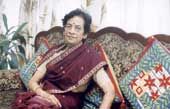 |
| Lakshahira Das .Pictures by S.H. Patgiri |
Lakshahira Das thinks she has been lucky. “Few people get the chance to do what they really want to do,” points out the septuagenarian. In her characteristic soft voice, she says almost in monosyllables: “I am a person of few words. I like to maintain a low profile and quietly go about my work”.
Poised and composed in a sober cotton sari with subdued floral prints, she looks up and adjusts her golden-rimmed spectacles. In her no-nonsense manner she says, “I hardly get time to socialise or indulge in any kind of unnecessary banter. Interestingly, after retiring from service, I keep all the more busy,” she adds. She retired as professor and head of department of education of Gauhati University.
Swinging a perfect balance between her professional and personal life, apart from being a successful mother, she has carved a niche for herself as an academician, poet, lyricist and singer.
More importantly, she connects well with the present generation and has translated many children’s stories by Oscar Wilde and O’Henry and a book of traditional lullabies. “I got interested in children’s literature while bringing up my three sons,” she says.
“I owe a lot to my father, as my mother died when I was only eight. My father, who was a borgeet singer had a collection of records and periodicals on music,” says Das.
She recalls her first stage performance in 1941 at a literary meet in Barpeta, which was attended by luminaries like Ambikagiri Roy Choudhury and Suryya Kumar Bhuyan. “I have faint memories of my father taking me to the venue on a cycle. He had taught me the song Kiyonu Pahora Asomiya Hera... from an Assamese record,” she remembers.
Conferred the title of Sangeet Dipika and Sangeetacharya, Das was the first and only Assamese lady to be recognised by the All India Radio in 1948 as a lyricist, composer and singer while she was a student of Cotton College.
“I was staying at white memorial hostel at Mission Compound, Panbazar, as there were no college hostel then. The hostel superintendent, an American lady, was very strict. She allowed me to go for late-night programmes only if I was dropped back at the hostel,” Das recalls.
The gramophone company, HMV, has recorded 22 of her songs, including borgeet, lokageet, lullabies and modern songs. She was also the playback singer and lyricist of two Assamese films, Sarapat and Lachit Borphukan. Till date, she had penned nearly 2,000 lyrics, which were also sung by noted singers like Manna Dey, Anup Ghosal and Bhupen Hazarika.
She tried to fill the void of formal training in classical music in her childhood by taking lessons in borgeet from Guru Dayal Chandra Sutradhar and Gandho Ram Bayan.
“I took lessons in classical music from Ramchandra Partabardhan and Birendra Kumar Phookan. It was very tiring as I had to juggle time between my work and my family,” says Das.
Accolades followed soon after and she was conferred the best lyricist award of the Northeast by Kala Sangam in 1995. She also received an award as a playback singer in the golden jubilee celebration of the Cine Artists’ Association in 1985. As a young girl, Lakshahira was very studious. A brilliant academic career was a logical corollary and she was awarded a PhD degree by Gauhati University in 1973.
So far, 17 scholars have done their PhD under her guidance. “One step followed another,” she says.
She has also presided over and presented research papers at many international conferences at Nairobi, Tanzania, Malaysia, Singapore, London and Paris.
In tune with her scholarly interests, she has written 14 books on education for college and university levels.
She also pens her thoughts about the vicissitudes of life and nature through her evocative poems. “My senses were always receptive to my surroundings. Prabhati was my first poem at the age of nine,” she says. Her poems have been translated into English, Bengali, Hindi, Oriya, Punjabi, Telugu, Gujarati and Manipuri.
Her poems have been included in several anthologies of poetry including Modern Assamese Poetry, edited by Hem Barua, New Voices of Indian Poetry, edited by Rajendra Awasthy, Assamese Poetry, collected and published by the directorate of information and public relations, Assam, and the Souvenir volume of The North East India’s Poets Meet.
She has vivid memories of the world conference of writers in Kuala Lumpur, Malaysia, in 1991 where her collection of English poems titled Between Births was released by S. Gunasingha from Sri Lanka. “I recited few of my poems and I will always cherish those moments,” says Das.
As president of Suratirtha, a cultural organisation, she played a leading role in the production of long-playing records and cassettes of Assamese musicians of the yesteryears like Ambikagiri Roy Choudhury, Umesh Chandra Choudhary and Nalinibala Devi.
Even today, she has her finger in several pies. She is an active member of the Authors’ Guild of India, Poetry Society of India, the International Forum of Poets, London, and the Indian Pen. This year, she has been made member of the general council of Sahitya Akademi. At present, she is working on her autobiography with the help of clippings from her diary, which has regularly maintained.
“However, I cannot stay away from music,” she says. Recently, two cassettes, Antara, based on her songs, and Puharor Khipaar Thikona, based on her poetry, were released.
Her creative soul is forever restless. It is almost dark now and as she stands on her balcony, a refreshing breeze fanning her hair.
Taking a deep breath, she says, “My best song is yet to be written.” And adds on a plaintive note, “I have miles to go before I sleep.....”.











